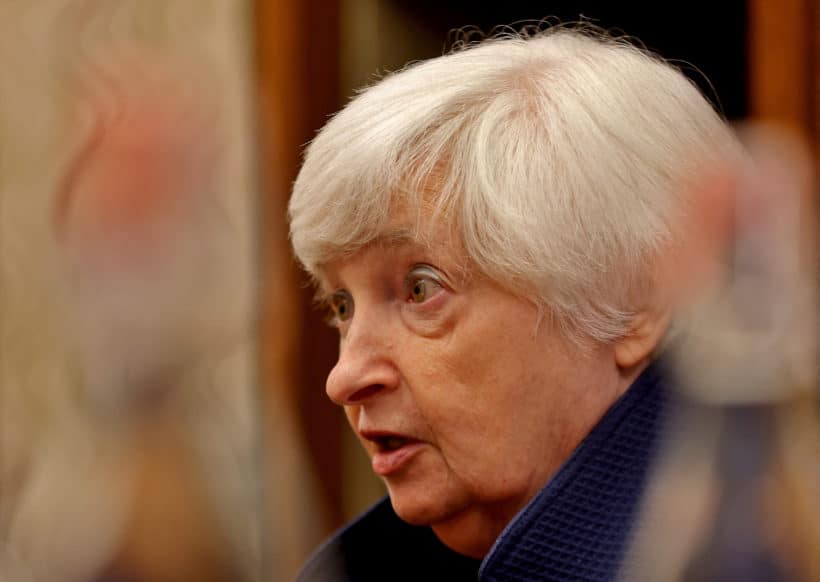
DAKAR, Jan 20 (Reuters) – Russia’s war against Ukraine is hitting Africans particularly hard by exacerbating food insecurity and putting an unnecessary drag on the continent’s economy, U.S. Treasury Secretary Janet Yellen said in Senegal’s capital Dakar on Friday.
Yellen said ending the war would be the best thing to help the global economy, but Treasury estimated that a Group of Seven-led price cap on Russian crude oil and refined products to limit Russia’s revenues could save the 17 largest net oil-importing African countries $6 billion annually.
Speaking at the start of a three-country visit to Africa, Yellen said some emerging market countries were saving even more by using the price cap to negotiate steeper discounts with Russia, and Treasury was encouraging others to follow suit.
G7 countries and Australia implemented the oil price cap on Dec. 5, banning the use of Western-supplied maritime insurance, finance and other services for cargoes priced above $60 per barrel. A further cap on Russian refined petroleum products, such as diesel and fuel oil, is due to take effect on Feb. 5.
Yellen said the United States was working with African leaders to mitigate the damage caused by Russia’s “illegal and unprovoked war” in Ukraine, which along with COVID-19 had slowed growth and pushed millions of Africans into poverty and hunger.
Washington provided about $13 billion in emergency aid and food assistance last year, and was now setting up a U.S.-Africa strategic partnership to address the short-term food needs of more than 300 million Africans, Yellen said. It is also helping to build more resilient and sustainable systems for the future.
Yellen is the first of a number of top U.S. officials who plan to visit Africa this year, including President Joe Biden, as Washington seeks to deepen ties with the continent and provide a counterweight to China, whose collateralized loans have left many nations deeply in debt.
Speaking at a co-working space that helps women and young entrepreneurs, Yellen drew sharp contrasts with other countries’ investment, emphasizing that U.S. investments in Africa were motivated by “our mutually beneficial, long-term partnership” with a goal of generating positive economic returns.
It is a message Yellen plans to hammer home throughout her visit, with further stops planned in Zambia and South Africa, contrasting the U.S. approach with that of China and other countries active on the continent.
She said Africans were demanding greater accountability and transparency from their governments, calling them a prerequisite for sustainable economic growth. U.S. engagement, she said, prioritized “adherence to high standards like transparency, good governance, accountability, and environmental sustainability.”
In certain cases, she said Washington could also condition investments on political reforms that would help mobilize private sector investments.
“While our approach may be exacting, we believe it delivers lasting results. Countries need to be wary of shiny deals that may be opaque and ultimately fail to actually benefit the people they were purportedly designed to help in the first place,” she said. “This can leave countries with a legacy of debt, diverted resources, and environmental destruction.”
‘ENORMOUS POTENTIAL’
Yellen, long critical of the pace of China’s efforts on debt treatments for Zambia and other countries, said it was important to provide “timely and comprehensive” solutions to allow African economies to continue to make important public investments.
“We believe that the international community, including China, needs to provide meaningful debt relief to help countries regain their footing,” she said.
Yellen met earlier with Senegal’s Minister of Economy, International Planning, and Cooperation Oulimata Sarr, who like Yellen is also the first woman to serve in her current role.
The U.S. Treasury secretary will meet later with Senegalese President Macky Sall and Finance Minister Mamadou Moustapha Bâ.
Yellen told business leaders from the American Chamber of Commerce that the overriding focus of her visit is “the enormous economic potential of the continent, thanks to its demographic trends and the impressive dynamism of its entrepreneurs.”
“The U.S. is committed to working with Africa to realize that promise, because we know that a stronger African economy is good for the world, and good for the United States,” she said.
(Reporting by Andrea Shalal; Editing by Toby Chopra)

